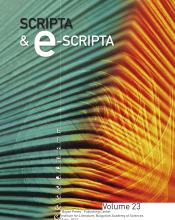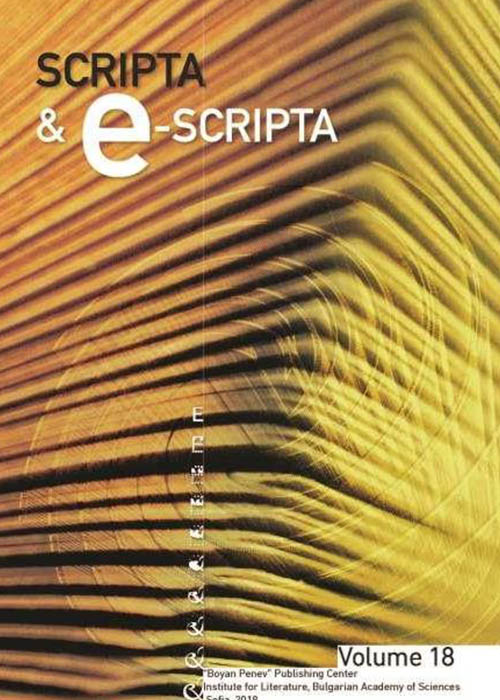Способы демонстрции данных славянского исторического полнотекстового корпуса “Манускрипт”
Data Demonstration Techniques in Slavonic Historical Text Corpus “Manuscript”

- Author(s): Victor Baranov Roman M. Gnutikov Maria Novak
- Subject(s): Language studies // Language and Literature Studies // Theoretical Linguistics // Applied Linguistics // Historical Linguistics // Computational linguistics // Philology // Translation Studies //
-
Published by: Institute for Literature BAS

- Print ISSN: 1312-238X
- Summary/Abstract:
The article discusses theoretical and practical issues of creating tools for demonstrating medieval Slavonic text corpus at the “Manuscript” website (http:// manuscripts.ru/). The specific features of the historical corpus and its sources are: the limited number of manuscripts, variability of medieval graphics and orthography, complex structure, and composition of original documents. They require special instruments and techniques for data preparation (information about a text and its physical media, analytical tagging of fragments, variability, and other), and visualization of data sampling, including texts. The article focuses on the ways of solving two opposite tasks: the texts’ demonstration in a form as close as possible to the original and their simplified form, and, consequently, the possibilities of their transformation. The first task should be solved by preparing a transcription via a specialized editing tool, which interacts with the full-text database with a complete set of required characters, text formatting, and make-up to fit the original page. To solve the second problem, analytical tagging (chapters and verses, authors of texts, structure of manuscript, main text and marginalia, and so forth) and linguistic tagging (including lemmatization) are performed to make data search and data transformation available when displayed. The latter allows users to see a text in modern Cyrillic or Latin, syllables, meaning of analytical fragments, links between the main text and its marginalia, and so forth. The ability to data search based on deep tagging and the digital edition (LIM, MS 37, 13th c., 291 f.) which has been included in the “Manuscript” historical corpus (http://manuscripts.ru/mns/main?P_TEXT=94065041&p_lang=EN).
Journal: Scripta & e-Scripta vol. 23, 2023
-
Page Range: 35-72
No. of Pages: 38
Language: Russian - LINK CEEOL: https://www.ceeol.com/search/article-detail?id=1196214
-
Victor BaranovRussiaBaranov, Victor, Prof., DSc. Kalazhnikov Izhevsk State Technical University, RussiaDescription
Victor A. Baranov, Kalashnikov Izhevsk State Technical University, Doctor of Philological Sciences, Professor. Field of specialization: The history of Russian language, dialectology, phonetics of the modern Russian language, computer linguistics, full- text databases, publication of ancient Slavonic manuscripts, corpus linguistics, linguistic statistics, head of the project The historical corpus “Manuscript” (manuscripts.ru).
Roman M. GnutikovUdmurt State UniversityDescriptionRoman M. Gnutikov, Udmurt State University. Programmer, main developer of the components, modules and programs of The historical corpus “Manuscript”.
Maria NovakRussiaИнститу русского языка им. В.В. ВиноградоваDescriptionМария Олеговна Новак, доктор филологических наук, ведущий научный сотрудник Института русского языка им. В.В. Виноградова Российской академии наук; специализация: история русского язы- ка; научные интересы: история русского языка, церковнославянский язык, переводная древнеславянская книжность, история лексики славянских языков, текстология, языковые контакты.
-